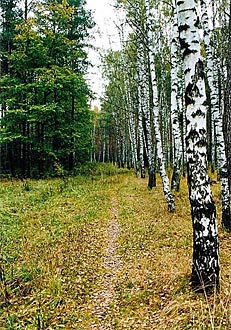|
 Elk Island straddles the boundary between Moscow proper and the suburbs of the north-west of the city, and is home to an amazing variety of animal and plant life.
Elk Island straddles the boundary between Moscow proper and the suburbs of the north-west of the city, and is home to an amazing variety of animal and plant life.
More than 200 different species of animal live here, many of them hiding away in the depths of the forest, including dappled deer, roe deer, elk and wild boar. Beavers and otters live in the riverbanks, and there are rare types of bird, including pheasant, grey partridge, and egret. The park's richest asset is the woodland that makes up 85 percent of its area. Of particular note is the Alexeev Copse, which has pine-trees up to 200 years old and spruces up to 170 years old. The Copse lies along the old road through Elk Island which once linked Moscow to the towns of Suzdal and Vladimir.
Historical documents say that Elk Island was a favorite place for Ivan the Terrible to enjoy falconry and bear-hunting. The name Elk Island was recorded in the early 17th century, when documents say that the place was used for hunting "all manner of game birds, and especially elk". From the turn of the century come documents banning hunting "around Moscow", without exception - punishments included hefty fines and banishment to far-flung regions of Russia.
Organized forestry on Elk Island began in 1842, when fire-breaks were cut through, dividing the area up into separate sections. In 1983 Elk Island was declared a state national nature park.
Getting there: The closest metro station to the park is Ulitsa Podbelskogo. Elk Island can also be reached from Sokolniki Metro Station through the park of the same name.
|

 Elk Island straddles the boundary between Moscow proper and the suburbs of the north-west of the city, and is home to an amazing variety of animal and plant life.
Elk Island straddles the boundary between Moscow proper and the suburbs of the north-west of the city, and is home to an amazing variety of animal and plant life.